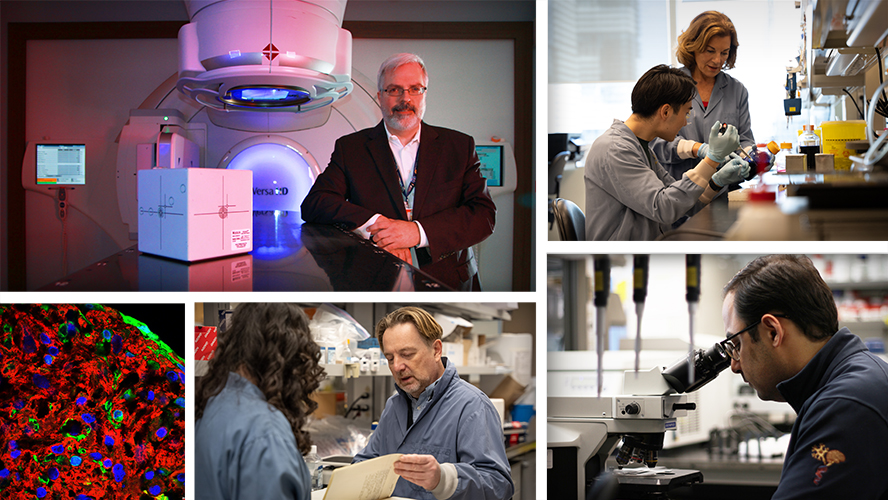
At UHN, research is focused on advancing medical knowledge to improve patient care. With over 1,190 principal investigators and 2,020 trainees across six research institutes, UHN’s research is comprehensive; it includes basic discovery research in topics like DNA modification and clinical studies and trials to explore new treatments, techniques or approaches for patients like health care accessibility. Collaborations across labs, institutes, and global organizations enable us to bring life-changing discoveries from the lab to the clinic.
With its emphasis on collaboration, UHN is leading the way in transforming discoveries into practice.
Investigating the Mechanisms of Health
UHN researchers are exploring the fundamental mechanisms of disease, identifying new therapy targets, predicting disease risk, and developing effective prevention strategies.
This is true for many types of diseases, including cancer, where researchers at the Princess Margaret Cancer Centre (PM) have discovered a novel way to target key drivers of cancer. By investigating proteins required for the function of a powerful driver of cancer, a team of researchers has identified a new potential therapeutic target.
Investigators are also examining the molecular foundations of brain health in an effort to identify and improve treatments. Researchers at the Krembil Research Institute have uncovered molecular links between liver health and the blood-central nervous system barrier (BCB). These molecules could serve as targets for new drugs to treat diseases that involve dysfunction in the BCB.
In efforts to treat various forms of cardiovascular disease, researchers at McEwen Stem Cell Institute (McEwen) and Toronto General Hospital Research Institute (TGHRI) are taking different approaches to answer important heart health questions. At McEwen, scientists are advancing heart disease knowledge by creating accurate cardiac models and exploring proteins that could help repair damaged heart tissue. At TGHRI, findings on how blood vessel cells communicate with surrounding cells may help in treating cardiovascular diseases like atherosclerosis, a condition characterized by a gradual buildup of plaque in the walls of arteries.
Bridging Research and Patient Care
One of UHN's greatest strengths is translating scientific discoveries into real-world health care solutions. Through collaboration and cutting-edge techniques, our researchers are transforming treatments and therapies.
An exciting area of innovation at UHN is in cancer detection and imaging where a team at PM is improving cancer detection with real-time imaging techniques. Scientists are also transforming cancer recurrence detection by developing more sensitive and accurate methods to monitor signs of cervical cancer relapse.
UHN is spearheading many clinical trials aimed at bringing therapies to the people. At Krembil Brain Institute, a promising new therapy for glioblastoma—a notoriously difficult-to-treat brain cancer—was tested in an early-phase clinical trial where it was shown to prolong patient survival. In addition, a new anticancer drug targeting gene mutations was tested in an early-phase trial through a multi-country collaborative effort including PM.
UHN is also transforming rehabilitation therapies and health care education in many ways: from uncovering better ways to assess hand function recovery after spinal cord injury at the KITE Research Institute to studying how to reshape cancer care education for family physicians at The Institute for Education Research.
Driving Innovation
As Canada’s leader in biomedical research commercialization, UHN is driving the translation of discoveries into impactful health care solutions with the support of experts from the Commercialization at UHN team.
Through industry partnerships and collaborations, Commercialization at UHN facilitates the market entry of innovative medical services, devices, and therapies. A significant milestone in this journey was this year’s launch of the UHN-wide Accelerator Fund in partnership with UHN Foundation and The Princess Margaret Cancer Foundation, to support the de-risking and market acceleration of technologies at UHN.
In the past fiscal year, companies incubated at UHN secured $83.9 million in financing, with an incorporation of two new companies—Curait and Nanogenix, both focused on improving cancer care. UHN also celebrated its 20th annual Inventor of the Year, Dr. Frances Chung, for her development of the STOP-Bang questionnaire, a novel clinical tool commercialized around the world to dramatically increase the proper diagnosis of sleep apnea.
Technologies discovered and developed at UHN act as the basis for many global products and services, including pharmaceuticals, biologics, devices, and diagnostics. Read about other examples of commercialization as a result of research at UHN.
- Improving Radiation Therapy
- Green Light for Cancer Therapy
- Advancing Cancer Detection Technologies with UHN’s Adela
- Commercialization Success Stories
Looking to the Future
Discovering basic biological processes, initiating clinical trials, improving therapies, and bringing these findings to the public, are all steps that UHN takes to chart the path to A Healthier World. New drug targets will be studied further, clinical trials will advance to the next stages, and therapeutics will reach the public through continued investigations in all of these types of research.




